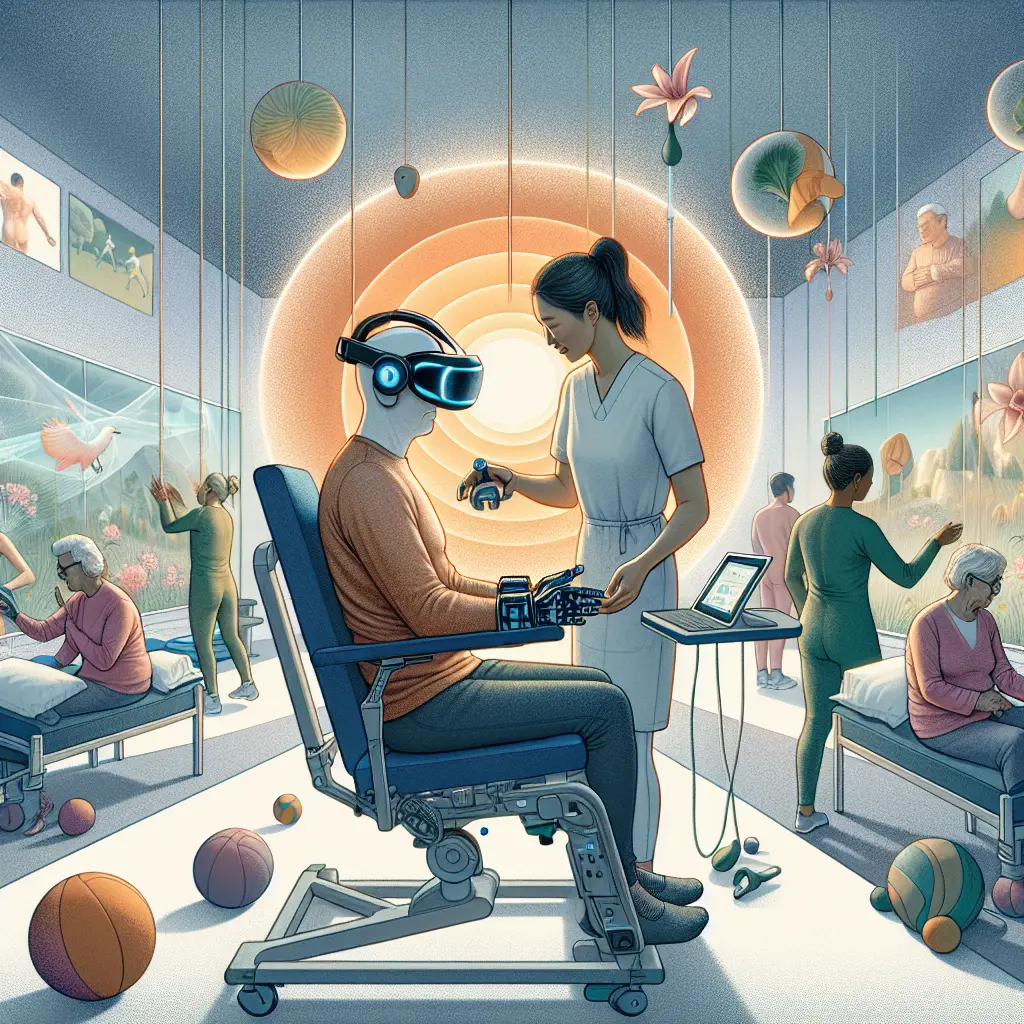In the rapidly evolving landscape of healthcare, Virtual Reality Therapy is emerging as a groundbreaking tool for accelerating physical rehabilitation. As more people seek innovative rehab solutions, Virtual Reality in Healthcare is carving a niche by offering immersive and effective treatment options. From Virtual Reality Physical Therapy to VR Therapy for Injuries, the integration of VR technology in medical practices is reshaping the traditional approaches to recovery.
Virtual Reality Treatment Reviews highlight the VR Therapy Benefits, emphasizing its role in providing accelerated rehabilitation and enhancing the effectiveness of conventional therapies. Patients and professionals alike are sharing positive Opinions on VR Therapy, noting its potential in transforming physical recovery processes. Notably, Virtual Reality for Stroke Recovery and Virtual Reality Pain Management stand out as areas where VR Rehabilitation Techniques have shown promising results.
Despite its advantages, understanding the Pros and Cons of VR Therapy is crucial for those considering this cutting-edge rehabilitation technology. As we explore Patient Opinions on VR Therapy and VR Therapy Success Stories, it becomes evident that the future of physical rehabilitation may lie in the virtual realm. Virtual Reality in Physical Recovery is not just a trend but a testament to the possibilities of innovative healthcare solutions.
As we delve deeper into this topic, we'll examine how Virtual Reality Therapy is redefining the path to recovery, offering new hope and strategies for those undergoing rehabilitation. Join us as we explore the intricate dynamics of VR therapy and its implications for the future of patient care.
In recent years, Virtual Reality Therapy has become a transformative force in accelerating physical rehabilitation, bringing new hope and possibilities to patients and healthcare professionals alike. As we examine how this technology is redefining the path to recovery, it's essential to explore the latest developments, patient experiences, and clinical studies that highlight its effectiveness and potential.
Advancements in VR Therapy for Physical Rehabilitation
Virtual Reality in Healthcare is continuously evolving, with innovations that make it an increasingly viable option for those seeking accelerated rehabilitation. A recent study published in the Journal of NeuroEngineering and Rehabilitation demonstrated significant improvements in motor function among stroke survivors who incorporated Virtual Reality Physical Therapy into their recovery regimen. This underscores the VR Therapy Benefits that many patients experience, particularly in terms of motivation and engagement compared to traditional therapies.
Moreover, VR Therapy for Injuries is gaining traction, particularly for conditions like musculoskeletal disorders and sports injuries. The immersive nature of VR allows patients to participate in controlled and repeatable exercises without the stress or risk associated with real-world scenarios. A case study from Stanford University revealed that athletes recovering from ACL injuries showed faster progress in VR environments due to enhanced visual feedback and real-time performance monitoring.
Patient Opinions on VR Therapy are overwhelmingly positive, with many reporting not only physical improvements but also psychological benefits. Patients often describe feeling more motivated and less anxious when engaged in VR-based exercises. The gamified elements of VR Rehabilitation Techniques can transform otherwise monotonous tasks into exciting challenges, thus improving adherence to rehabilitation protocols.
The Future of Physical Rehabilitation likely involves a hybrid model where Virtual Reality Treatment Reviews play a crucial role in tailoring personalized rehab plans. For instance, incorporating virtual assessments could allow therapists to adjust therapy intensity based on real-time data, optimizing recovery pathways.
Addressing the Pros and Cons of VR Therapy
While the advantages of VR Therapy are numerous, it is vital to consider potential drawbacks. The cost of cutting-edge rehabilitation technology can be prohibitive for some institutions or patients, though prices are expected to decrease as the technology becomes more mainstream. Additionally, there can be a learning curve for both practitioners and patients unfamiliar with virtual environments.
However, the Pros and Cons of VR Therapy must be weighed against the backdrop of its potential to revolutionize recovery processes. For example, Virtual Reality Pain Management has been shown to effectively reduce pain perception during rehabilitation exercises, offering a non-pharmacological alternative for pain relief (source). This approach is particularly beneficial for patients with chronic pain conditions or those seeking to minimize medication use.
There are numerous VR Therapy Success Stories that showcase the technology's impact on physical recovery. One notable example is a collaboration between the Royal National Orthopaedic Hospital in the UK and the University College London, which developed a VR program specifically for amputee rehabilitation. Participants reported a 30% improvement in prosthetic limb usage compared to those undergoing conventional therapy (source).
Similarly, Virtual Reality for Stroke Recovery has made significant strides. A 2023 pilot program at Johns Hopkins Medicine utilized a VR platform to simulate daily activities for stroke patients. Results indicated that participants regained independence more rapidly than those following standard protocols (source).
The Role of Virtual Reality in Future Rehabilitation Strategies
As we look ahead, Virtual Reality in Physical Recovery represents not just a trend but a fundamental shift in how rehabilitation is approached. Innovative Rehab Solutions such as these are likely to become integral components of comprehensive care plans, offering customizable and scalable solutions for diverse patient populations.
The implications of integrating VR into standard practices are profound. Imagine a future where therapists can remotely monitor patients' progress through virtual sessions or where individuals in remote areas have access to top-tier rehabilitation resources via VR technology. Such possibilities underscore the importance of ongoing research and development in this field.
For those considering Virtual Reality Therapy as part of their rehabilitation journey, staying informed about the latest trends and findings is crucial. Engaging with platforms like Healthline or Mayo Clinic can provide valuable insights into the ongoing evolution of VR technologies and their applications in healthcare.
Moreover, understanding how Virtual Reality Treatment Reviews are shaping patient expectations can help tailor more effective therapeutic interventions. What aspects do patients find most beneficial? How can these insights be leveraged to enhance existing rehabilitation programs?
In conclusion, as we continue to explore the dynamic landscape of Virtual Reality Therapy for physical rehabilitation, it's clear that this technology holds immense potential to redefine recovery experiences. By focusing on patient-centric outcomes and embracing innovative solutions, healthcare providers can pave the way for more effective and engaging rehabilitation journeys.
In summary, Virtual Reality Therapy is reshaping the landscape of physical rehabilitation with its innovative and patient-centric approach. Here are some key takeaways from our exploration:
- Advancements and Effectiveness: VR Therapy has proven to enhance motor function in stroke survivors and accelerate recovery for athletes, as seen in studies from the Journal of NeuroEngineering and Rehabilitation and Stanford University.
- Patient Experiences: Patients report increased motivation and reduced anxiety, benefiting both physically and psychologically from VR-based exercises.
- Pros and Cons: While cost and learning curves are considerations, the benefits, such as effective pain management without medication, highlight VR's revolutionary potential.
- Success Stories: Real-world applications, like those at the Royal National Orthopaedic Hospital and Johns Hopkins Medicine, demonstrate significant improvements in rehabilitation outcomes.
- Future Implications: VR in rehabilitation promises to offer customizable solutions and remote access, potentially transforming standard care practices.
As VR Therapy continues to evolve, it offers exciting possibilities for more effective and engaging rehabilitation journeys. We encourage you to reflect on these developments and consider how they might influence your perspective on physical recovery. Have you or someone you know experienced VR Therapy? We'd love to hear your thoughts or experiences. Share them in the comments below or engage with us on our social media channels.
Thank you for joining us on this exploration of Virtual Reality's transformative role in physical rehabilitation. Stay informed and inspired as we move towards a future where technology and healthcare converge for better patient outcomes.






Leave a Comment